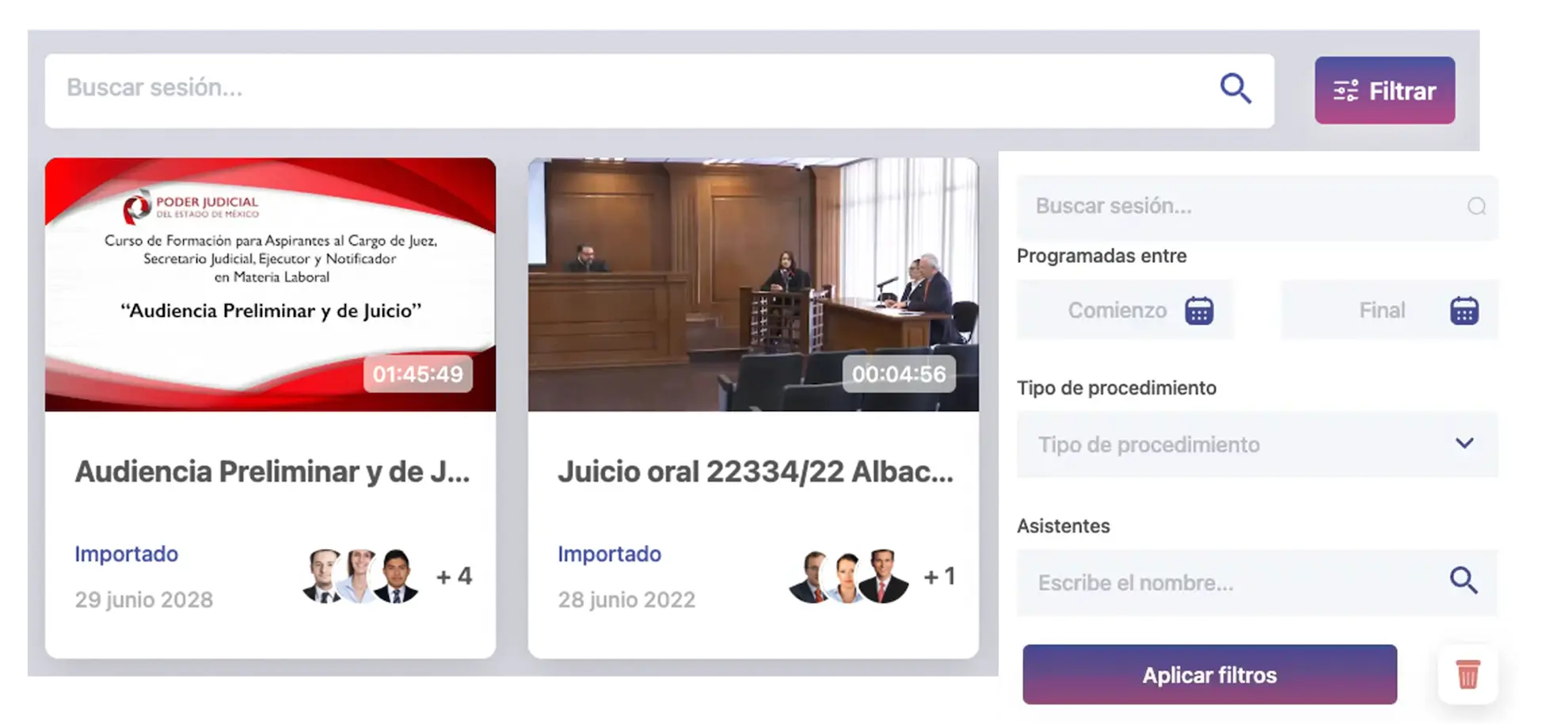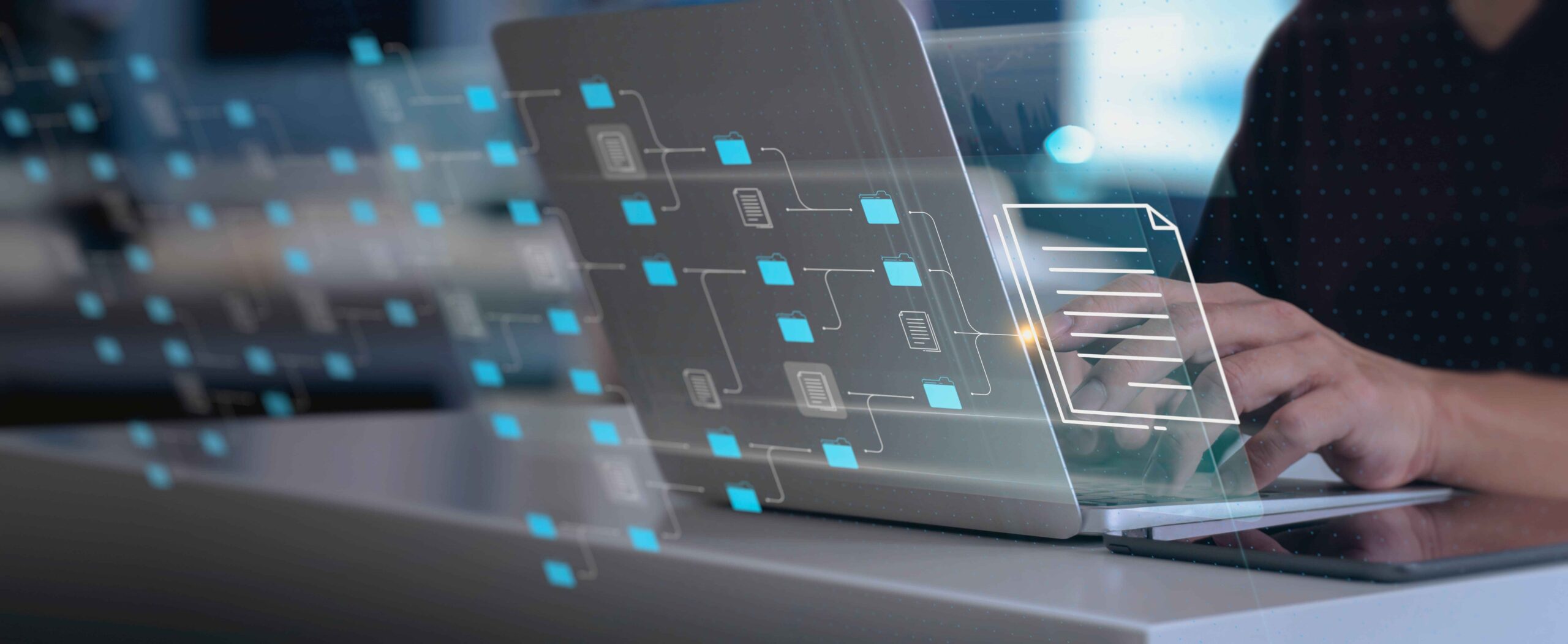Optimize Legal Statement Management: Tools for Efficient Archiving
In the legal world, efficient management of legal statements is crucial to building strong cases and preparing for court proceedings. With the help of specialized archiving systems, lawyers can securely store and organize witness statements, facilitating quick access to information when needed. In this article, we’ll explore how legal deposition archiving systems are transforming legal practice and how you can leverage these tools to optimize your work.
Legal Testimony Archiving System:
Legal Testimony Archiving Systems provide a centralized platform for storing and managing witness statements. These tools enable attorneys to efficiently upload, organize and search depositions, facilitating case preparation and court discovery.
Secure storage of court depositions is critical to protect the confidentiality and integrity of information. Archiving systems offer cloud storage options with high security and encryption standards, ensuring that depositions are protected from unauthorized access or data loss.


Digital Witness Testimony Archive:
Digital archiving of witness testimony provides a convenient and accessible way to store and access legal depositions. These platforms offer advanced search functions that allow attorneys to find relevant information within large volumes of depositions quickly.
One of the most prominent features of these platforms is the systematic organization of legal filings. The ability to tag and categorize documents allows lawyers to maintain a clear and consistent structure in their files.
In addition, digital filing platforms often include collaborative tools that allow multiple users to simultaneously access and work on the same documents. This is especially useful in large legal teams where coordination and communication are essential. Annotation and commenting features allow lawyers to add notes and observations directly into documents, facilitating collaborative review and analysis.
Security is another key advantage of digital witness testimony archives. These platforms typically have robust security measures in place to protect the confidentiality of sensitive information. Data is encrypted and strict access controls are implemented to ensure that only authorized personnel can view and modify documents.
Testimonial Management System in cloud:
PROBUS offers an online testimony management system offer the flexibility to access and manage depositions from anywhere, anytime. This is especially useful for distributed legal teams or those who need to access depositions while out of the office.

Conclusion:
In summary, archiving systems for legal testimony are essential tools for any modern legal practice. By offering secure storage, efficient organization and quick access to witness statements, these platforms like PROBUS can help attorneys build strong cases and effectively prepare for court proceedings. If you are looking to optimize your legal deposition management, consider integrating a specialized archiving system into your legal practice.
Stronger Legal Cases: The Importance of Legal Indexing and Evidence Analysis
In modern legal practice, efficiency and accuracy are paramount. Indexing and legal content analysis are essential elements in managing large volumes of information and evidence effectively. In this article, we will explore how AI for lawyers is transforming the way legal professionals analyze court exhibits, categorize legal evidence, and organize key information to strengthen their cases.
Indexing Tools for Lawyers:
Indexing tools enable lawyers to sort and organize large amounts of legal information efficiently. These tools use advanced algorithms to tag and categorize documents, making it easy to search and retrieve relevant information at any time.
Court Evidence Analysis:
Judicial evidence analysis is a crucial part of the legal process. Legal content analysis tools use advanced techniques, such as natural language processing (NLP) and machine learning, to examine legal documents, identify patterns and extract relevant information that can strengthen an attorney’s position in the case.
Indexing and Categorizing Legal Evidence:
Indexing and categorizing legal evidence is critical to building strong arguments in court. Indexing tools allow lawyers to organize and label evidence in a consistent manner, making it easy to access and reference during the legal process.


Legal Document Analysis Software:
Legal document analysis software offers advanced functionality to examine and understand the content of legal documents. These tools can identify important clauses, analyze document structure and provide accurate summaries to streamline the legal review process.
Organizing and Searching Legal Information:
Organizing and searching legal information are common challenges for attorneys. Indexing tools simplify this process by enabling accurate categorization of information and fast, efficient search for relevant documents, case law and legal precedents.
How PROBUS helps you find what you need:
PROBUS incorporates advanced filters that allow you to locate specific information extremely efficiently. In a matter of seconds, you will be able to identify the exact segment of the recording where the topics you are looking for are discussed. This advanced technology ensures fast and accurate navigation through large volumes of data, optimizing your ability to find critical information quickly and accurately.

Conclusion:
In an increasingly complex and competitive legal environment, legal content indexing and analysis tools are indispensable allies for lawyers. By leveraging innovative technologies such as PROBUS, legal professionals can improve the efficiency of their practice, strengthen their arguments and better serve their clients, as they no longer have to deal with repetitive administrative tasks.
Best Software for Transcribing Court Recordings: A Comparison
For legal professionals, transcription of court recordings is an invaluable tool. Today, there are several options on the market for converting audio or video of trials into text. These tools can vary in accuracy, speed, advanced features and, above all, in their ability to integrate into a lawyer’s workflow. In this article, we compare some of the best software for transcribing court recordings, highlighting why Probus is an outstanding choice over other alternatives.
Why Use Software to Transcribe Court Recordings?
The volume of information in court cases can be overwhelming. Without a proper transcription system, too much time is spent reviewing recordings. The benefits of using court transcription software include:
- Time savings by eliminating the need to review every minute of recording.
- Immediate access to key information in text, allowing for quick search and analysis.
- Organized and easily shareable documentation in a variety of formats.
Comparison of the Leading Court Transcription Tools
In the following, we will analyse the features and advantages of three of the best court transcription tools on the market: Probus, Trint and Otter.ai.
1. Probus: The Complete Solution for Legal Professionals
Probus is a platform specialised in the transcription and management of court recordings, developed with advanced artificial intelligence and focused on the specific needs of lawyers and solicitors. Probus allows you to transcribe hours of court recordings in minutes and offers collaboration and analysis tools specially designed for the legal field.
Probus Key Features:
Fast, automatic transcription with text search across the entire transcript.
Speaker ID, allowing the different parties involved in the trial to be distinguished.
Team collaboration, allowing transcripts and comments to be shared securely and in real time.
Access from any device and download in Word format, ideal for sharing or presenting in case files.
Data security adapted to the needs of the judicial environment, ensuring the privacy and confidentiality of the information.
Advantages: Probus stands out for its specific focus on the legal field, providing advanced functionalities not found in other general transcription software. Its accessibility and team collaboration capabilities allow for optimised workflow for complex cases.
2. Trint: General Transcription Software with Editing Options
Trint is an automatic transcription tool that uses artificial intelligence to convert audio to text in a variety of sectors, including media and business. Although not designed exclusively for the legal sector, Trint offers several useful features for transcribing court recordings.
Key features of Trint:
Collaborative online editing, allowing multiple users to annotate and make corrections to the transcript.
Integration with file management tools such as Google Drive, which facilitates workflow in cases with shared documentation.
Text search, although without specialised speaker identifier.
Benefits: Trint is a fast and affordable option for those who need transcription in multiple languages. However, it lacks the advanced speaker identification and specific security features offered by Probus, which limits its usefulness in the legal field, where accuracy and correct attribution of each statement is essential.
3. Otter.ai: Rapid Transcription with a Focus on Meetings and Education
Otter.ai is a platform known for its real-time transcription capabilities and ease of use in meetings and conferences. Its speaker identification system and collaboration options make it a suitable tool for basic transcription needs.
Key features of Otter.ai:
Real-time transcription, which is useful for accessing an immediate summary of discussions in meetings.
Integration with video conferencing platforms such as Zoom and Google Meet, making it easy to capture transcripts in online meetings.
Export functions to PDF and other formats, useful for those who want to save and share transcripts in an easily accessible file.
Benefit: Otter.ai is ideal for transcribing team meetings or conferences, but its accuracy decreases in noisy or multi-voice environments such as courtrooms.

Why is Probus the Best Choice for Transcribing Court Recordings?
While Trint and Otter.ai are excellent choices for the business and education sector, Probus is positioned as the best software for transcribing court recordings due to its specialised design for lawyers and solicitors. With features such as advanced speaker identification, accurate transcription in minutes and collaboration tools, Probus optimises workflow in the legal environment and ensures data security, which is crucial in this sector.
Conclusion
Although there are many software options for transcribing court recordings, Probus stands out as the ideal solution for lawyers and solicitors. Its specific focus on the legal field, coupled with its advanced security and collaboration capabilities, make it stand out from more generic tools.With Probus, legal professionals can save time and access crucial case information faster and more accurately.
Don’t miss the opportunity to integrate automatic transcription technology into your office today.
Keep Your Cases in Order: Advanced Solutions for Legal Audiovisual Evidence Management
In the digital age, efficient management of trial recordings is essential for legal professionals. With the growing amount of legal audiovisual evidence, having a robust platform to manage and store these recordings has become crucial. In this article, we will explore how specialized platforms are transforming the way trial recordings are handled, offering advanced solutions for the secure management and storage of legal audiovisual evidence.
Platform to Manage Legal Recordings:
Platforms designed specifically for managing legal audiovisual evidence offer a range of advanced functionality. From efficient uploading to organizing and tagging trial recordings, these tools simplify access and reference to evidence when it is needed most. PROBUS stands out as one of the leading options in this field, with features that streamline the workflow of legal professionals.
PROBUS not only allows for quick and easy uploading of trial recordings, but also offers advanced organization tools. Users can tag each recording with relevant metadata, such as date, case type, participants and more, making it easy to search and retrieve later. In addition, the ability to create custom folders and subfolders helps maintain an orderly and easily navigable structure for all cases and associated evidence.
Digital Court Hearings Archive:
Digital archiving of court hearings is an integral part of trial record management. These archives provide a centralized repository for storing all recordings, making it easy to search and retrieve relevant audiovisual evidence when needed.


Organization and Categorization: Keys to Orderly Management
Effective management of court evidence files requires meticulous organization and accurate categorization. Specialized platforms offer intuitive tools for this task, ensuring that each file is easily identifiable and available for use when needed, significantly reducing the time spent searching and preparing cases.
PROBUS allows users to organize trial recordings based on a variety of criteria, such as date, client name, case type and more. This makes it easy to quickly locate specific evidence, which in turn streamlines the process of preparing for hearings or trials. In addition, the ability to assign tags and keywords to each recording further enhances the ability to search and retrieve relevant information.
Judicial Evidence File Management:
Judicial evidence file management is critical to ensuring the integrity and accessibility of evidence. Specialized platforms offer tools to organize and categorize trial recordings, ensuring that each file is easily identifiable and available for use when needed.
Secure Storage of Trial Recordings:
Secure storage of trial recordings is a major concern for legal professionals. Recording management platforms offer cloud-based storage options with high security and encryption standards, ensuring the protection of confidential and sensitive information.


Legal Audiovisual Evidence Management:
Efficient management of legal audiovisual evidence is crucial to the preparation and presentation of cases in court. Specialized platforms facilitate the organization and search of trial recordings, allowing lawyers to quickly access the evidence needed to support their legal arguments and strategies, and PROBUS has this functionality as well.
Conclusion:
In summary, in an increasingly digitized legal world, the efficient management of trial recordings has become a determining factor for success in legal practice. By using specialized platforms to manage and store legal audiovisual evidence, legal professionals can optimize their work, improve case preparation and offer a more complete and effective service to their clients. Consider integrating a specialized platform like PROBUS to make the most of your legal audiovisual evidence and keep your cases organized efficiently.
Optimizing Legal Practice: Court Hearing Transcription
In the legal world, accuracy and documentation are essential. Transcription of court hearings is a critical part of this process, ensuring that every word and testimony is accurately and completely recorded. In this article, we will explore how legal transcription services and tools are revolutionizing the way court hearings and legal testimony are handled.
Legal Transcription: The Importance of Accuracy
When it comes to legal testimony and court hearings, every word counts. Legal transcription services specialize in accurately capturing every detail, from witness statements to questions and answers during a trial. This accuracy is critical to ensuring that a complete and reliable record of legal proceedings is available.
The best legal transcription services employ highly trained human transcriptionists and expert proofreaders to ensure accuracy and consistency in every document. This not only meets legal and compliance standards, but also provides attorneys and judges with the confidence that they are working with accurate and reliable information.


Accurate Transcription of Legal Testimony: Ensuring the Integrity of the Legal Process
Legal testimony is critical in any legal case, and accurate transcription of this testimony is crucial to preserving the integrity of the legal process. Legal transcription services specialize in capturing every word spoken during a deposition, no matter how fast they are spoken or how complex the legal language used.
By ensuring that legal testimony is accurately transcribed, these services provide reliable documentation that can be referenced and cited in future legal proceedings. This is especially important in cases where heavy reliance is placed on witness testimony to establish facts and determine liability.
Court Hearing Transcription: Streamlining the Legal Process
Court hearings can be complex and full of important details. Transcription of these hearings is crucial to ensure that all aspects of the case are accurately and completely recorded. Legal transcription services take care of capturing every word spoken during a hearing, from opening statements to closing arguments.
By providing accurate and detailed transcripts of court hearings, these services help streamline the legal process by giving attorneys and judges quick and easy access to relevant information. This allows for more effective preparation for future hearings and facilitates case review by the parties involved.


Trial Transcription Software: Technology in the Service of Law
Technology also plays an important role in the legal transcription process. Trial transcription software uses advanced algorithms to automatically convert audio from court hearings into written text. While this technology can be useful for preliminary transcripts, it is important to keep in mind that accuracy can vary and human review is still critical to ensure accuracy.
However, trial transcription software such as PROBUS can be a valuable tool for streamlining the transcription process and reducing the costs associated with human transcription services. By combining technology with human expertise, attorneys can obtain accurate and complete transcripts in less time and with less effort.
Converting Audio to Legal Text: Facilitating Case Management
In conclusion, court hearing transcription is a fundamental part of modern legal practice. Legal transcription services and trial transcription software such as PROBUS play a crucial role in this process, ensuring that every word spoken during a testimony or hearing is captured accurately and completely. By providing accurate and reliable transcripts, these services and tools facilitate legal case management and help ensure a fair and transparent legal process.
Exploring AI Platforms for Lawyers: A Detailed Look at AI Platforms for Attorneys
In today’s digital age, platforms for lawyers have evolved significantly, offering comprehensive solutions and technology tools that transform the way legal professionals manage their cases. In this article, we will explore how these platforms are revolutionizing legal practice thanks to artificial intelligence (AI) and other innovative technologies.
AI-driven transformation
Lawyer platforms are embracing AI to improve various aspects of legal case management. From identifying important clauses in contracts to predicting legal outcomes, AI is fundamentally changing the way legal tasks are performed.
Contract Analysis
AI can examine contracts and legal documents efficiently, identifying relevant clauses and potential risks. This automated analysis capability saves lawyers time and resources in document review.
Legal Search and Precedent Analysis
With the vast volume of legal information available in online databases, finding relevant cases and precedents can be a challenging and time-consuming task. AI streamlines this process by analyzing large legal datasets and providing accurate search results.
Predicting Legal Outcomes
By leveraging historical data and legal patterns, AI can predict possible outcomes in legal cases. This predictive capability helps lawyers make informed decisions and develop effective legal strategies.


Automation and Efficiency
In addition to analytical capabilities, platforms for lawyers also offer automation tools that improve case management efficiency.
Legal Document Automation
AI can automatically generate a variety of legal documents, such as contracts and agreements, based on predefined templates and specific parameters. This automation saves time in creating repetitive documents and reduces the risk of human error.
Legal Advice
By analyzing laws and regulations, AI can provide accurate recommendations to lawyers and clients. This data-driven legal advice capability improves decision-making and efficiency in solving legal problems.
Project Management and Scheduling
Lawyer platforms also facilitate legal project management by assisting in scheduling deadlines and assigning tasks. This functionality allows for more efficient case tracking and smoother collaboration among legal team members.
Automated Transcription with Unmatched Accuracy
A software tool designed for lawyers that focuses on transcribing legal recordings like PROBUS employs advanced artificial intelligence algorithms to automatically transform speech into text, achieving unparalleled accuracy and speed, streamlining both research and legal case preparation.

In short, platforms for lawyers are playing a pivotal role in the digital transformation of the legal sector. From contract analysis to project management, these technology tools are improving the efficiency and effectiveness of the legal practice, paving the way to a smarter, more collaborative future for legal professionals.
Legal Research: Optimizing Legal Assistance and Analysis
Legal research is a fundamental pillar in the practice of law, and the adoption of advanced technologies is radically transforming the way it is conducted. In this article, we will explore the different facets of legal research and how tools powered by artificial intelligence (AI) are revolutionizing this crucial field.
Case Law Analysis
Case law analysis is essential to understanding the interpretation and application of the law in past cases. With the help of AI-powered search, precedent identification becomes more efficient and accurate, paving the way for more thorough and informed legal research.
Statutory Research
Statutory research involves the analysis of existing laws and regulations to support legal arguments. Automated analysis of statutes, and verification of regulatory compliance, streamlines the search for relevant information and ensures compliance with applicable regulations.


Document Review
Document review is a laborious but crucial task in the legal process. With the help of AI-powered tools such as contract analysis and risk assessment, the extraction of important clauses is simplified and the associated risk assessment is streamlined.
Virtual Legal Assistants
Virtual legal assistants provide support in legal research and case preparation. With advanced search functions and case preparation assistance, these tools improve the productivity and efficiency of legal professionals.
Predictive Analytics
Predictive analytics uses historical data to predict outcomes and rulings in legal cases. By predicting case outcomes and rulings, legal professionals are given a clearer view of possible outcomes and helped to make informed decisions.
Technology in the Courtroom
In the courtroom, technology plays a crucial role in evidence presentation and real-time transcription. With real-time evidence presentation and transcription tools, communication and documentation during court proceedings is improved.
Handling large volumes of legal recordings
Effective content management is crucial. This involves organizing and storing documents and evidence properly, which can determine the outcome of a case. Lawyers can manage their digital files with ease, with intelligent transcription without having to spend hours searching for the information. Keep an orderly record of all recordings and documents related to each case, and collaborate efficiently with colleagues and clients.

In short, the integration of advanced technologies in legal research such as PROBUS is revolutionizing the practice of law, optimizing processes and providing invaluable support to professionals in the field.
Types of transcripts in the judicial field and their significance
In the judicial arena, transcripts stand as fundamental pillars underpinning the integrity and transparency of legal proceedings. They are not merely limited to capturing dialogues and events; rather, they represent a meticulous narrative of judicial events, preserving every detail with surgical precision. These meticulously crafted transcripts serve as witnesses to the truth, recording every word uttered, every argument presented, and every decision made within the framework of justice. In this detailed exploration, we break down the different types of court transcripts and examine their profound relevance in the development and resolution of legal cases.
Hearing Transcripts
Court hearings are crucial events where legal arguments are discussed and presented. Hearing transcripts in judicial are divided into:
- Testimony Transcripts: These transcripts record testimony presented during hearings, which may be from expert witnesses or eyewitnesses.
- Pleadings Transcripts: Pleadings, both opening and closing, are critical to the development of a case. Pleading transcripts capture the legal arguments presented by the parties involved.


Transcripts of Interrogations
During the judicial process, interrogations of witnesses and defendants are conducted to clarify the facts. These are subdivided into:
- Interrogations of Witnesses: Record the questioning and answers of witnesses.
- Interrogations of Defendants: Document the interrogations of the defendants in the case.
Transcripts of Evidence
Documentary and expert evidence is essential to support legal claims. Transcripts of evidence are divided into:
- Documentary Evidence Transcripts: Record the physical evidence presented in court.
- Expert Evidence Transcripts: Document evidence provided by experts in specific areas.
Importance of Court Transcripts
Court transcripts not only record events, but also play a crucial role in the legal process due to:
- Legal Evidence: Transcripts serve as tangible legal evidence that can be referenced during later stages of the legal process.
- Accurate Record: They provide a detailed and accurate record of what occurred in the courtroom, avoiding misunderstandings or misinterpretations.
- Facilitation of the Judicial Process: They help streamline and facilitate the judicial process by providing clear and accessible documentation for all parties involved.

Conclusion
In conclusion, court transcripts are fundamental elements in the administration of justice, ensuring integrity and transparency in legal proceedings. Moreover, the main users of court transcripts, such as lawyers and solicitors, rely on this documentation to prepare their legal arguments and defend their clients’ interests effectively.
In the digital age we are seeing significant progress thanks to new artificial intelligence (AI) tools such as PROBUS geared towards trial transcripts. These innovations enable greater efficiency in the generation and management of transcripts by employing technologies such as intervener identification, automated transcription, voice biometrics to verify the authenticity of voices, and subtitle generation to make information more accessible.
These tools not only streamline the transcription process, but also improve its accuracy and accessibility, contributing to a more efficient and transparent administration of justice for the benefit of all parties involved.
LegalTech Talk: Shaping the Future of Law and Technology
Madrid — February 19, 2024 — Legal professionals and technology enthusiasts are eagerly anticipating the inaugural launch of LegalTech Talk, set to take place in London on June 13th and 14th, 2024. This groundbreaking event promises to be a transformative experience for attendees, offering unparalleled insights into the dynamic intersection of law and technology.
The Dawn of Legal Innovation: Introducing LegalTech Talk
LegalTech Talk is poised to revolutionize the way legal professionals engage with technology, offering a platform dedicated to exploring the latest advancements, trends, and challenges in the legal tech landscape. With its inaugural event scheduled for June 13th and 14th, 2024, in London, LegalTech Talk aims to unite thought leaders, innovators, and enthusiasts from around the globe to discuss and shape the future of law and technology.
Bradley Collins, CEO of LegalTech Talk, expressed enthusiasm about the upcoming event: “LegalTech Talk represents a pivotal moment for the legal industry, where technology is driving unprecedented innovation and transformation. Our event will serve as a catalyst for meaningful dialogue, collaboration, and knowledge-sharing among legal professionals, technologists, and entrepreneurs.”


Empowering Collaboration and Innovation
The two-day event will feature a diverse array of sessions, workshops, and networking opportunities designed to inspire and educate attendees. From keynote presentations by industry luminaries to interactive panel discussions and hands-on workshops, LegalTech Talk offers something for everyone interested in the evolving landscape of legal technology.
Attendees can expect to explore topics such as artificial intelligence, blockchain, automation, cybersecurity, and much more. With a focus on practical insights and real-world applications, LegalTech Talk is committed to equipping participants with the knowledge and tools they need to thrive in today’s digital legal ecosystem.
Join the Conversation
Legal professionals, technologists, entrepreneurs, and enthusiasts alike are invited to join the conversation at LegalTech Talk. Whether you’re looking to stay abreast of the latest trends, connect with industry peers, or explore new opportunities, this event is not to be missed.
At Probus, we are always eager to support and engage with great events that explore the intersection of technology and the legal sector. As a leading advocate for innovation and progress in the legal industry, we recognize the importance of platforms in driving positive change and shaping the future of law. We look forward to participating in this exciting event and continuing our commitment to fostering collaboration and advancement within the legal tech community.

About Probus:
PROBUS is a comprehensive online platform tailored for legal professionals. It offers advanced features like transcription, indexing, analysis, and editing for video or audio recordings of court proceedings. By harnessing cutting-edge AI technology, Probus helps lawyers and attorneys save time and effort, allowing them to focus on high-value tasks. With Probus, legal practitioners can efficiently navigate their work, optimizing productivity and effectiveness.
Modernizing the Legal World: Artificial Intelligence and its Impact on Trial Transcription
In the legal environment, efficiency and accuracy in content management, especially in trial transcription, are crucial to the success of any case. With the advancement of technology, artificial intelligence (AI) has revolutionized the way legal professionals approach these tasks. In this article, we will explore how AI-based lawyer software for trial transcription and content management is transforming legal practice.
Advanced Solutions for Trial Transcription
Today’s lawyers and attorneys face an ever-increasing workload related to the documentation and management of legal cases. Accurate transcription of trials, hearings and testimony is essential for the preparation of arguments, identification of relevant details and monitoring of legal proceedings. This is where audio and video transcription and management software designed specifically for legal professionals comes into play.


Automated Transcription with Unmatched Accuracy
Lawyer-based trial transcription and content management software for lawyers uses advanced AI algorithms to automatically convert spoken speech into written text with unmatched accuracy and speed. In addition, the ability to index and analyze transcribed content enables rapid search and retrieval of relevant information, facilitating legal research and case preparation.
Efficient Legal Content Management
Efficient content management is also critical in the legal field, where the proper organization and storage of documents and evidence can make the difference between the success and failure of a case. Legal professionals can easily archive and manage their digital files, keep an orderly record of all recordings and documents related to each case, and collaborate effectively with colleagues and clients.


Other applications of AI in the legal field
- Contract analysis: AI can examine contracts and legal documents to identify important clauses and potential risks.
- Legal search and precedent analysis: AI helps find relevant cases and precedents in large legal databases, streamlining legal research.
- Predicting legal outcomes: Using historical data and legal patterns, AI can predict possible outcomes in legal cases.
- Legal document automation: AI automatically generates documents such as contracts and agreements, saving time in creating repetitive documents.
- Legal advice: Analyzes laws and regulations to provide accurate recommendations to lawyers and clients.
- Project management and scheduling: Assists in scheduling deadlines and managing legal tasks for more efficient case tracking.
Conclusión
In few words, the power of artificial intelligence in legal practice is undeniable. Software for lawyers based on trial transcription and content management such as PROBUS offers an innovative and efficient solution to the daily challenges faced by legal professionals. By leveraging AI capabilities, lawyers and attorneys can improve the quality of their work, optimize their processes and provide better service to their clients.








